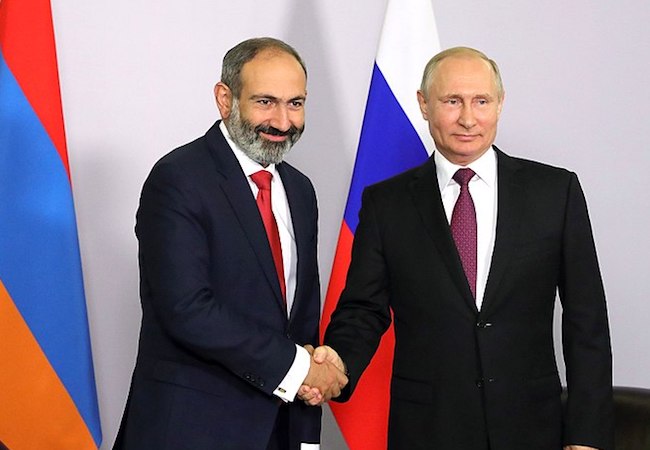Armenia misses another opportunity

By Dr. Stephen Blank
When National Security Advisor John Bolton travelled to the Caucasus in late 2018 he had several objectives in mind. Generally he wanted to launch the reassertion of American engagement with and influence in the Caucasus. Specifically this broad goal subsumed within it the ideas of helping to regenerate negotiations for real peace in the Armeno-Azeri “frozen conflict” over Nagorno-Karabakh and engaging Armenia’s new revolutionary government. That engagement would, in turn, strengthen ties with a government that sought to bring about democratic rule and genuine economic prosperity for Armenia. As part of his agenda Bolton also made it clear that Washington viewed Armenia’s close ties with Iran, its major trade partner, with disfavor. Therefore to induce Armenia to take “decisive steps” towards resolving the Nagorno-Karabakh conflict and to distance itself from Moscow and Tehran Bolton offered economic incentives and even the possibility of U.S. arms sales to Armenia. Indeed, Russian arms sales to both sides certainly make it harder to regenerate a peace process concerning Nagorno-Karabakh and subordinate Armenia to Russian interests.
Instead Armenia has apparently disregarded both Bolton and its own domestic needs.. In fact, the Armenian government seems determined to go out of its way to antagonize the U.S. Not only is Prime Minister Nikol Pashinyan visiting Iran on February 27, his ambassador said Armenia would do everything it could to boost ties with Iran. Once in Iran he stated Armenia’s readiness to transport Iranian gas and oil abroad. Rather than buy U.S. weapons, Armenia has again turned to Moscow to buy 12 Sukhoi-30 fighters that it neither needs nor can afford. In another gesture to Russia Pashinyan sent a delegation of 83 Armenians (admittedly many of who are doctors) to Syria to relieve the humanitarian nightmare there. In still another move that makes no sense for a government ostensibly committed to a democratic transformation if not revolution in Armenia, the government is discussing with Huawei, the giant Chinese telecom firm, purchasing its “smart city” technology that Freedom House defined as exemplifying “the Chinese model of extensive censorship and automated surveillance systems.”
Finally Pashinyan evidently remains unwilling to negotiate seriously with Azerbaijan. His Foreign Minister has again stated that Karabakh must participate in future negotiations as an independent actor and Pashinyan has frequently echoed this idea, also stating that he cannot negotiate on behalf of Karabakh and that otherwise talks cannot move forward. When he and Azerbaijani President Aliyev met at Davos in January for an hour and a half he even refused to acknowledge that these were official talks. Consequently if Pashinyan cannot negotiate now even after having won a landslide referendum on his plans for democratic and economic reform when can he negotiate? In other words, if not now when? And if his government insists on Karabakh being an independent actor then there will be no talks because Karabakh’s status is the basic question at issue. This demand, as Pashinyan and his government clearly understand, represents a red flag to Baku and signals a fundamental lack of seriousness regarding negotiations. All these actions seem deliberately intended to rebuff U.S. overtures.
Moreover, buying unneeded and unaffordable fighters from Moscow adds nothing to his credibility and undermines Armenia’s independence. Indeed, Yerevan seems unable to grasp that in order to realize its vast economic and political reforms it must end the war. The warlords of Nagorno-Karabakh and their cronies in Yerevan are tied to Moscow and to perpetuating the status quo from which they have profited immensely. Pashinyan’s reform program is anathema to them. And Moscow already clearly suspects Pashinyan’s regime’s tendencies and direction. So Russia neither support his reforms nor any peace other than its suzerainty over both states.
Admittedly Armenia’s freedom of maneuver is quite circumscribed due to its previous economic-strategic dependence on Moscow and Tehran. But Bolton’s offers clearly aimed to crate an opportunity for Armenia that would increase its freedom to act independently and , even more important realize its far-reaching domestic program. Indeed, without decisive moves to towards ending neither Armenia’s government nor its economy can undergo serious reforms. Peace with Azerbaijan breaks Turkey’s blockade of Armenia and permits the inclusion of Armenia in regional infrastructural energy and transportation projects from which it has been hitherto excluded.
Thus it seems quite clear that Armenia has once again squandered an opportunity to benefit itself and take decisive steps towards genuine peace, prosperity, greater democracy, and independence. Armenia’s failure here also undermines prospects for realizing the Administration’s goals in the Caucasus. But that is a setback Washington can easily absorb. Indeed, a regional failure to respond to Bolton’s initiatives might lead it back into the unhappy experience of the Obama years when malign neglect of the region characterized U.S. policy. But for an Armenia that wants to overcome the past, bring about major democratic reforms, and transform the domestic economy failure to seize this opportunity for peace and enhanced economic-political freedom will have long and enduring negative consequences.
Democratization and subordination to Moscow are incompatible just as is true security and peace are incompatible with being Russia’s satellite. In the former Soviet Union democratization and peace mean sweeping away the authoritarian and belligerent Communist heritage. Russia’s failure to do so has had lasting and visibly negative consequences. Unfortunately Armenia has evidently decided to follow this road rather than realize where its true interests lie.
Dr. Stephen Blank is a Senior Fellow at the American Foreign Policy Council




